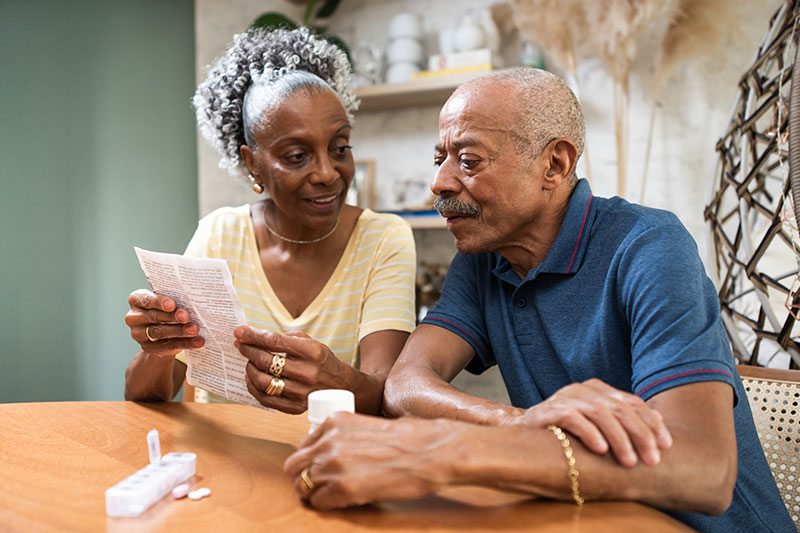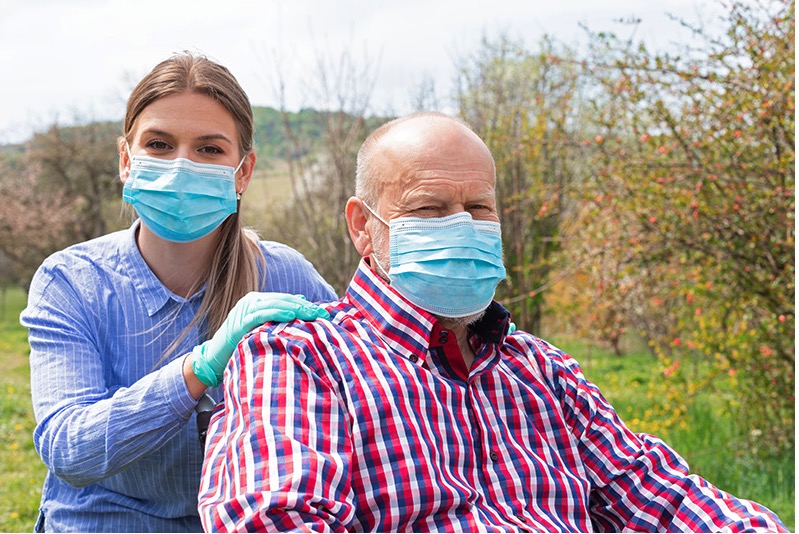
Senior Medications: Could Someone You Love Be Overmedicated? The days of “take two aspirin and call me in the morning” have transformed into “take two of these…and two of these…and maybe one of those, too!” Nearly forty percent of older adults are taking at least five different prescription medications each day – not to mention vitamins, supplements, and OTC meds. It is easy to see why problems are so prevalent when it comes to senior medications. Take these actions to prevent medication complications for a senior you love: Make a list, and check it twice. Create a list of every one of the medications – both prescription and over-the-counter – that a senior loved one is currently taking. Share the list with all the older adult's healthcare providers, and provide updated lists whenever there is a change in medications. Then at a minimum of every six months, review the list with their primary care physician to verify that all of the meds are necessary and that current doses are ideal. Don’t be afraid to ask questions. Ensure…

How to Handle Aggression in Dementia with the 6 R’s Of the many challenging behaviors common in dementia, perhaps the most difficult to manage is aggression. A senior who has always been mild-mannered can suddenly lash out in outbursts that are truly frightening: hitting, yelling, cursing, kicking, biting, or throwing objects. How can you, as a family caregiver, safely help restore a sense of calm? First of all, remind yourself that aggression in dementia is caused by the disease. It’s not something the person can control, and it is not intentional. That being said, it must be diffused in order to keep both you and the senior safe from harm. “The 6 R’s of Managing Difficult Behavior,” developed by Dr. Peter Rabins and Nancy Mace in their book The 36-Hour Day, can be an effective way to help. Read through and refer back to them so you’re prepared for the next burst of aggression. The 6 R’s: Restrict. Maintain a calm demeanor and tone of voice as you work to help the person disengage from the behavior. Reassess. Think through…

Check the Medicine Cabinet: The Side Effects of These Drugs Can Mimic Dementia Disorientation. Confusion.. Memory loss. While these are definitely hallmark symptoms of Alzheimer’s disease as well as other types of dementia, they may also come about from taking specific medications. Rather than immediately assuming an inevitable diagnosis of dementia, review the following list of prescribed medicines which can cause similar adverse effects. Pain Medications Opioids in particular are reported to affect short-term memory. The good news is that the problem is commonly remedied once pain medicines are no longer being taken. Acetylcholine Blockers Prescribed to treat IBS, insomnia, urinary incontinence, depression, heart issues, vertigo, Parkinson’s, and other conditions, medications with anticholinergic effects that block acetylcholine’s effects in the brain may cause memory disturbance, confusion, agitation, and delirium, among other significant health conditions. An example is tolteridine. Benzodiazepines These medications help treat both anxiety and insomnia,…

Polypharmacy for Seniors: Is Your Loved One Over-Prescribed? With more than a third of all 60-year-olds taking five or more prescription medications, it’s no surprise that problems are resulting from polypharmacy for seniors. Polypharmacy, defined as “…when an adverse drug effect is misinterpreted as a new medical problem – leading to the prescribing of more medication to treat the initial drug-induced symptom,” can result in a variety of additional health risks or worsening of existing conditions. So how can you determine if medications for seniors are truly helping, or possibly doing more harm than good? Before overmedication becomes a concern, it’s recommended that seniors and their caregivers take a careful inventory of prescriptions being taken, and have a plan in place for de-prescribing when needed. The following steps can help: Put together a list of all medications, including prescriptions, OTC drugs, and vitamin or herbal supplements, and share with the primary care physician and pharmacist. Request a review of both the medications…

What to Do with Expired and Unwanted Senior Medications With many older adults taking numerous prescriptions, and with doctors adding and changing dosages and medications to determine the ideal solutions, it’s crucial to understand what to do with expired and unwanted senior medications. There are several options: Check labels. The prescription's label or informational literature may provide directions about how to properly dispose of the drug. Bring unused and expired prescription drugs, over-the-counter medications and natural health products to your local pharmacist for proper disposal. All pharmacies in Canada are required to accept unused or expired medications any day of the year. Participate in a local municipality or police force take back program. Check your local area for program dates. Avoid flushing any medication down the toilet. This is an improper disposal of drugs that may contribute to pharmaceuticals being detected in the environment. Camouflage when disposing. If you must dispose of medications in the regular…

Home Care During the Pandemic: Keeping Seniors Safe For the past several months, family caregivers have had to manage seemingly monumental challenges in connection with the care of the seniors they love. With COVID-19’s specific dangers to the elderly and those with underlying health conditions, such as COPD, diabetes, heart problems, and others which are common in the elderly, families have struggled with keeping seniors safe and knowing how to best protect their older loved ones. To that end, some families made the very difficult choice to pause home care services to avoid having anyone outside of the family come into the home – meaning they were suddenly responsible for full-time elder care. Without a care partner, this alone is often unbelievably stressful, but add to that the many other new responsibilities and concerns as a result of the pandemic, such as shifting to working virtually, caring for young children who could no longer attend school or daycare, and more. To say it is been an overwhelming time is an understatement,…




















